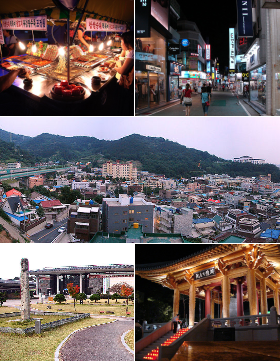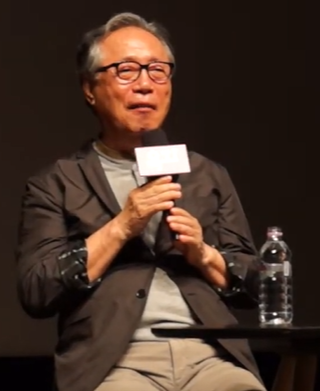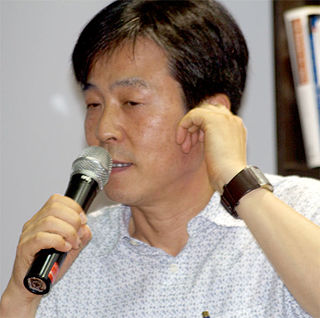
Gwangju is South Korea's sixth-largest metropolis. It is a designated metropolitan city under the direct control of the central government's Home Minister. The city was also the capital of South Jeolla Province until the provincial office moved to the southern village of Namak in Muan County in 2005 because Gwangju was promoted to a metropolitan city and was independent of South Jeolla province.

Mokpo is a city in South Jeolla Province, South Korea, located at the southwestern tip of the Korean Peninsula, close to Yudal mountain. Mokpo has frequent high-speed train services to Seoul, and is the terminus for a number of ferry routes serving islands in the adjacent Yellow Sea and Dadohae National Maritime Park.

Iksan is a city and major railway junction in North Jeolla Province, South Korea.

The Gwangju Uprising, known in Korean as May 18, was a popular uprising in Gwangju, South Korea, in 1980. The uprising was a response to the coup d'état of May Seventeenth that installed Chun Doo-hwan as military dictator and implemented martial law. Following his ascent to power, Chun arrested opposition leaders, closed all universities, banned political activities, and suppressed the press. The uprising was violently suppressed by the South Korean military. The uprising is also known as the Gwangju Democratization Struggle, the Gwangju Massacre, the May 18 Democratic Uprising, or the May 18 Gwangju Democratization Movement.

Song Kang-ho is a South Korean actor. Song made his film debut in The Day a Pig Fell into the Well (1996), and came to national prominence with a series of critically acclaimed performances, including No. 3 (1997), Joint Security Area (2000), Sympathy for Mr. Vengeance (2002), Memories of Murder (2003), The Host (2006), and A Taxi Driver (2017). Song rose to international prominence for his performances in Snowpiercer (2013) and Parasite (2019), the latter of which won the Palme d'Or at the Cannes Film Festival and the Academy Award for Best Picture. He was awarded Best Actor at the 75th Cannes Film Festival for his performance in Broker. In 2020, The New York Times ranked him #6 on its list of the 25 Greatest Actors of the 21st Century. He has been named Gallup Korea's Film Actor of the Year four times.
SG Wannabe is a South Korean vocal group consisting of members Kim Yong-jun, Kim Jin-ho and Lee Seok-hoon. The group debuted in January 2004 with the single, "Timeless", from the album SG Wanna Be+, and won Best New Artist at the Golden Disc Awards, Seoul Music Awards, and SBS Gayo Daejeon. The group's second album, Saldaga, was the best-selling album of 2005 in South Korea and won Album of the Year at the Golden Disc Awards. Their next two albums, The 3rd Masterpiece (2006) and The Sentimental Chord (2007) were also commercial and critical successes.

Byun Hee-bong is a South Korean actor.

The Honam high-speed railway, also known as Honam HSR, is a high-speed rail between Osong and Mokpo in South Korea. The line is a part of Korail's Korea Train Express (KTX) system, accelerating Seoul–Mokpo and Seoul–Gwangju KTX high-speed services which currently use the existing conventional Honam Line. On April 1, 2015, the line was inaugurated by the South Korean President Park Geun-hye with the attendance of 1200 invited guests and members of the public at Gwangju Songjeong Station in Gwangju, the line's terminus. The line diverges from Osong station on the Gyeongbu high-speed railway, and stops at Gongju, Iksan, Jeongeup Stations. Journey times between Seoul and Gwangju has been cut from 2 h 40 min to just 90 min, making daily commuting possible. The Honam HSR is intended to bring business, and economic opportunities to the province of Jeollanam-do, which has seen slower development than other parts of South Korea. The line has been open to the public since April 2, 2015 for revenue service.

Lim Chul-Woo is a South Korean writer born in 1954, known for his subversive works.

Silenced is a 2011 South Korean crime drama film based on the novel The Crucible by Gong Ji-young, directed by Hwang Dong-hyuk and starring Gong Yoo and Jung Yu-mi. It is based on events that took place at Gwangju Inhwa School for the Deaf, where young Deaf students were the victims of repeated sexual assaults by faculty members over a period of five years in the early 2000s.

Channel A Corporation, known as Channel A, is a nationwide generalist cable TV network and broadcasting company in South Korea. The company's largest shareholder is Dong-A Media Group (DAMG), which consists of 12 affiliate companies including The Dong-a Ilbo. Channel A was launched on 1 December 2011. Channel A's management philosophy is 'Open & Creative' and the company slogan is 'Channel A, A Canvas that Holds Your Dreams.' JaeHo Kim currently serves as the chief executive officer of Channel A.
The 2013 Korean FA Cup, known as the 2013 Hana Bank FA Cup, was the 18th edition of the Korean FA Cup. Pohang Steelers became champions and qualified for the 2014 AFC Champions League.

Daily-Best Archive or Ilbe Storage, also known as Ilbe Garage, is a South Korean Internet forum that has a predominantly far-right userbase. The site was created in April 2010 and started as an archive of the "daily best" posts from DC Inside.
Lee SungBoo was a South Korean poet and novelist.
Kang Susie is a South Korean singer-songwriter. She debuted in 1990 with the release of her first album, "Violet Fragrance". She has also performed in Japan, and has also hosted radio program Kang Su-ji's Memories from 2013 to 2014.

Eun, Mihee is a South Korean novelist, writer, columnist, and a college lecturer. She was born in Mokpo, South Jeolla Province in southern South Korea and moved to Gwangju at 3 years old and grew up there. She was a radio actress at Munhwa Broadcasting Corporation in Gwangju in her early 20s and became a journalist at Jeonnam Maeil newspaper later. While working as a journalist, she realized that she really wanted to be a novelist. She started her work as a novelist and she won first prize the Jeonnam Ilbo Literature Award for the short novel What Kind of Silkworm's Dream in Cocoon in 1996. After that, she won the Munhwa Ilbo Literature Award in 1999 for another short novel: Bird Fly Again.

A Taxi Driver is a 2017 South Korean historical action drama film directed by Jang Hoon and written by Eom Yu-na, with Song Kang-ho starring in the title role, alongside Thomas Kretschmann, Yoo Hae-jin, and Ryu Jun-yeol.

Jürgen Hinzpeter was a German journalist best known for his coverage of South Korean topics.
Kim Jun Tae is a South Korean poet. His poetry generally unfolds in hometowns and rural villages and is an ode to the vitality of nature and the revolutionary power of the people. He became famous for his poem, "Aa gwangjuyeo, urinaraui sipjagayeo" which testified to the horrors of the May 18 Gwangju Democratization Movement. It was published on the front page of the daily regional newspaper and was later translated into both English and Japanese. He is the deputy director of the National Literature Authors Association and the director of the May 18 Memorial Foundation.
Kwak Hyo Hwan is a South Korean poet. Since his literary debut in 1996, he wrote a number of poems based on his interest in regions north of the Korean Peninsula, including Dandong, China, Tibet, Xinjiang Uyghurs Autonomous Region of China, Siberia, and Baykal. In the early 2000s, he served as the director-general of the Daesan Foundation and planned and organized a variety of events for the globalization of Korean literature.













